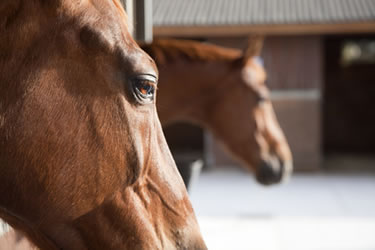Equine Protozoal Myeloencephalitis (EPM) Infection

Equine protozoal myeloencephalitis (EPM) is a neurological disease diagnosed in horses after exposure to protozoan parasites. Originating throughout North and South America, these parasites can infect and invade a horse’s central nervous system to such a degree that death can occur.
Incidence and Similarities of EPM
Since first studied in the 1970s, cases of EPM have been found in horses and ponies ranging from two months to 24 years of age. It is estimated that 50 percent of horses will be exposed to the parasite during their lifetime, but less than one percent of these will ever develop severe clinical symptoms.
Similarities in studied cases of EPM have been found to include:
- Onset of disease which can occur at any time of the year, but seems most prevalent during the summer and fall months.
- EPM is found most frequently in horses that range from one to six years of age.
- Cases have been found most prevalently in Thoroughbred, Standardbred, and Quarter horses.
- EPM has not been found in donkeys, mules, or non-horse equids.
Etiology of EPM
EPM begins with certain single-celled protozoan parasites, Sarcocystis neurona and Neospora hughesi. While these parasites find hosts in numerous mammals, such as raccoons, armadillos, skunks, and cats; the opossum has been identified as the reservoir host.
Steps of Infection for EPM
The basic steps of infection are as follows:
- Infected opossums shed the parasite in feces to infect the environment.
- Intermediate hosts, such as raccoon, armadillo, and skunk, further the development of the disease after ingesting the shed parasite.
- Horses consume the shed parasite while grazing in the infected environment and while eating grain or drinking water that has been contaminated with opossum feces.
- Parasites migrate from the horses’ gastrointestinal tract into the bloodstream.
- Severe cases of EPM occur when the parasite moves through the bloodstream to settle within the brain, spinal cord, or peripheral nerves.


Working Here
Our team members are encouraged to be the best they can be... at Covetrus we believe we impact one another.
Learn MoreNews & Events
FDA Cautions Pet Owners Not to Feed Texas Tripe Inc. Raw Pet Food Due to Salmonella, Listeria Monocytogenes
The U.S. Food and Drug Administration is cautioning pet owners not to feed their pets any of the Texas Tripe brand raw frozen pet food listed below because several samples of Texas Tripe raw pet food have tested positive for Salmonella and/or L. mono.
Careers
Are you looking for a place to let your talents shine? At Covetrus, we help our practitioner customers better serve their patients and take pride in providing the best customer experience possible. Search our open positions to see our available opportunities.
Newsletter
Stay current with what’s going on with Covetrus, subscribe to receive our newsletter and email communications. Subscribers will receive the latest information in practice management, sales and marketing, animal health, and more.



-3-(1).png?sfvrsn=2d806d73_0)

Leave a comment